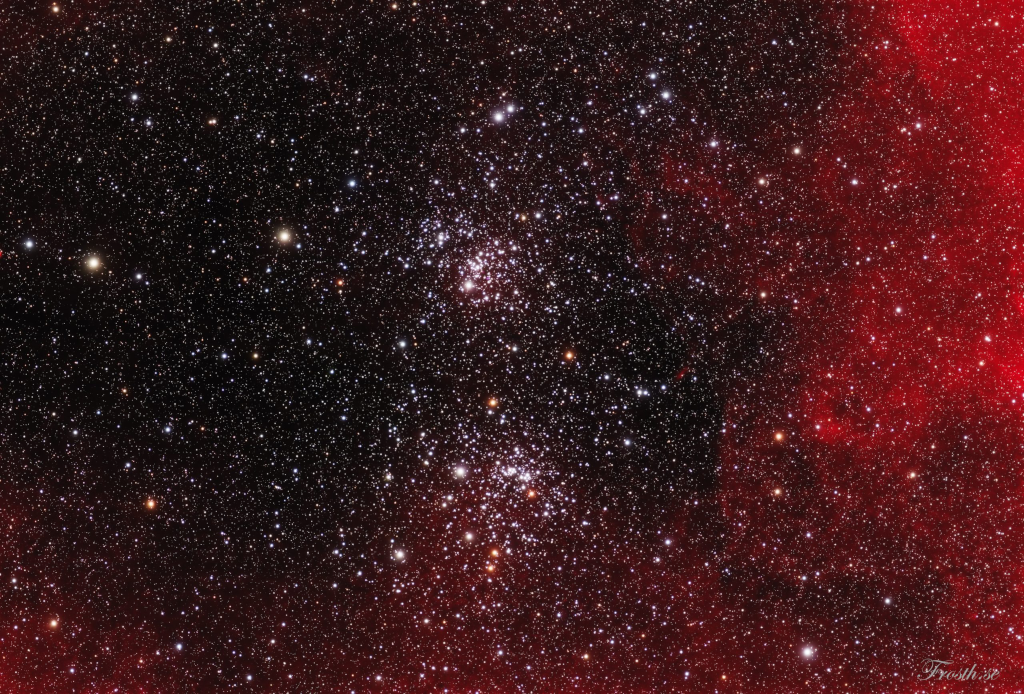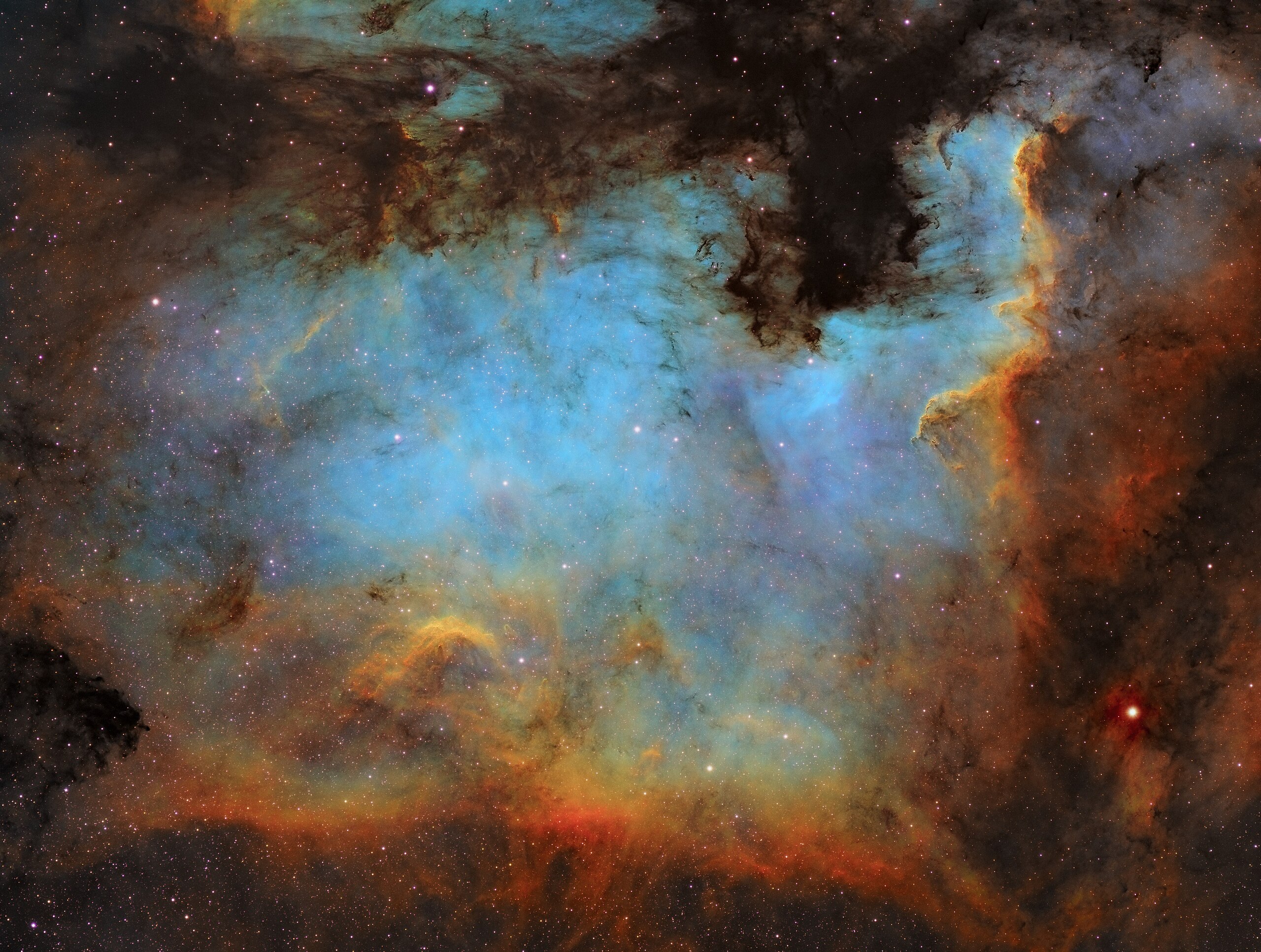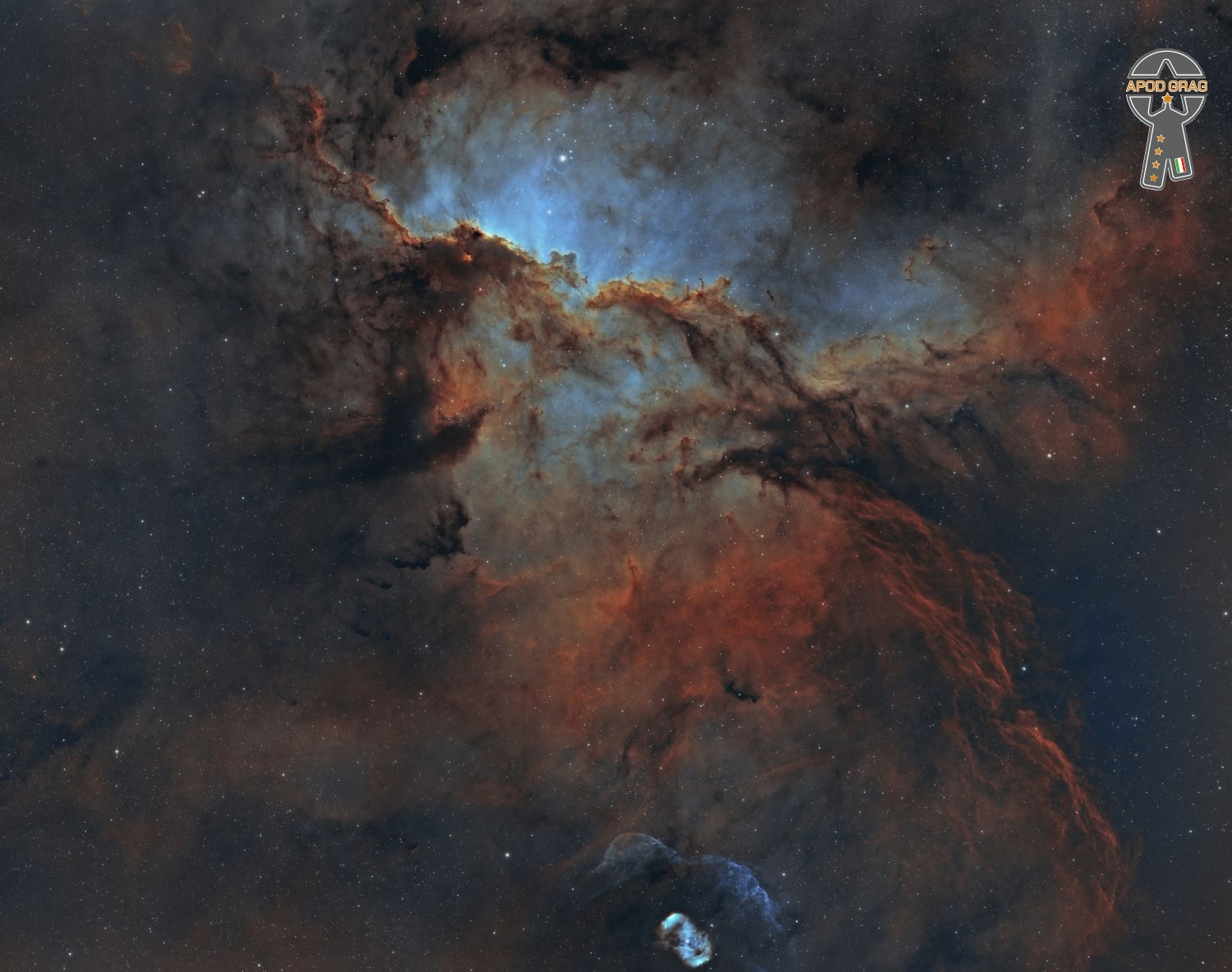Blog
NGC 869 spans about three full moons (1.5 degrees) across the heroic northern constellation of Perseus. It holds the famous pair of open star clusters, h and Chi Persei. Also cataloged as NGC 869 (top) and NGC 884, both clusters are about 7,000 light-years away and contain stars much younger and hotter than the Sun. Separated by only a few hundred light-years, the clusters are both 13 million years young based on the ages of their individual stars, evidence that they were likely a product of the same star-forming region. Always a rewarding sight in binoculars, the Double Cluster is even visible to the unaided eye from dark locations.

Sir Richard Starkey MBE (born 7 July 1940), known professionally as Ringo Starr, is an English musician, songwriter and actor who achieved international fame as the drummer for the Beatles. Starr occasionally sang lead vocals with the group, usually for one song on each album, including “Yellow Submarine” and “With a Little Help from My Friends“. He also wrote and sang the Beatles songs “Don’t Pass Me By” and “Octopus’s Garden“, and is credited as a co-writer of four others.
Starr was afflicted by life-threatening illnesses during childhood, with periods of prolonged hospitalisation. He briefly held a position with British Rail before securing an apprenticeship as a machinist at a Liverpool school equipment manufacturer. Soon afterwards, Starr became interested in the UK skiffle craze and developed a fervent admiration for the genre. In 1957, he co-founded his first band, the Eddie Clayton Skiffle Group, which earned several prestigious local bookings before the fad succumbed to American rock and roll around early 1958. When the Beatles formed in 1960, Starr was a member of another Liverpool group, Rory Storm and the Hurricanes. After achieving moderate success in the UK and Hamburg, he quit the Hurricanes when he was asked to join the Beatles in August 1962, replacing Pete Best.
In addition to the Beatles’ films, Starr has acted in numerous others. After the band’s break-up in 1970, he released several successful singles including the US top-ten hit “It Don’t Come Easy“, and number ones “Photograph” and “You’re Sixteen“. His most successful UK single was “Back Off Boogaloo“, which peaked at number two. He achieved commercial and critical success with his 1973 album Ringo, which was a top-ten release in both the UK and the US. Starr has featured in numerous documentaries, hosted television shows, narrated the first two series of the children’s television program Thomas & Friends and portrayed “Mr. Conductor” during the first season of the PBS children’s television series Shining Time Station. Since 1989, he has toured with thirteen variations of Ringo Starr & His All-Starr Band.
Starr’s playing style, which emphasised feel over technical virtuosity, influenced many drummers to reconsider their playing from a compositional perspective. He also influenced various modern drumming techniques, such as the matched grip, tuning the drums lower, and using muffling devices on tonal rings. In his opinion, his finest recorded performance was on the Beatles’ “Rain“. In 1999, he was inducted into the Modern Drummer Hall of Fame. In 2011, Rolling Stone readers named him the fifth-greatest drummer of all time. He was inducted twice into the Rock and Roll Hall of Fame, as a Beatle in 1988 and as a solo artist in 2015, and appointed a Knight Bachelor in the 2018 New Year Honours for services to music. In 2020, he was cited as the wealthiest drummer in the world, with a net worth of $350 million.
more...Josef Erich Zawinul 7 July 1932 – 11 September 2007) was an Austrian jazz and jazz fusion keyboardist and composer. First coming to prominence with saxophonist Cannonball Adderley, Zawinul went on to play with Miles Davis and to become one of the creators of jazz fusion, a musical genre that combined jazz with rock. He co-founded the groups Weather Report and The Zawinul Syndicate. He pioneered the use of electric piano and synthesizer, and was named “Best Electric Keyboardist” twenty-eight times by the readers of DownBeat magazine.
Zawinul grew up in Vienna, Austria. Accordion was his first instrument. When he was six or seven, he studied clarinet, violin, and piano at the Vienna Conservatory (Konservatorium Wien). During the 1950s he was a staff pianist for Polydor. He worked as a jazz musician with Hans Koller, Friedrich Gulda, Karl Drewo, and Fatty George. In 1959 he moved to the U.S. to attend Berklee College of Music, but a week later he received a job offer from Maynard Ferguson, so he left school and went on tour. He then accompanied Dinah Washington. He spent most of the 1960s with Cannonball Adderley.
more...Henry “Hank” Mobley (July 7, 1930 – May 30, 1986) was an American hard bop and soul jazz tenor saxophonist and composer. Mobley was described by Leonard Feather as the “middleweight champion of the tenor saxophone”, a metaphor used to describe his tone, that was neither as aggressive as John Coltrane nor as mellow as Lester Young, and his style that was laid-back, subtle and melodic, especially in contrast with players like Coltrane and Sonny Rollins. The critic Stacia Proefrock claimed him “one of the most underrated musicians of the bop era.” Mobley’s compositions included “Double Exposure,” “Soul Station”, and “Dig Dis,” among others.
Mobley was born in Eastman, Georgia, but was raised in Elizabeth, New Jersey, near Newark. He described himself as coming from a musical family and spoke of his uncle playing in a jazz band. As a child, Mobley played piano.
more...Lloyd “Tiny” Grimes (July 7, 1916 – March 4, 1989) was an American jazz and R&B guitarist. He was a member of the Art Tatum Trio from 1943 to 1944, was a backing musician on recording sessions, and later led his own bands, including a recording session with Charlie Parker. He is notable for playing the electric tenor guitar, a four-stringed instrument.
Grimes was born in Newport News, Virginia, United States, and began his musical career playing drums and one-fingered piano. In 1938 he took up the electric four-string tenor guitar. In 1940 he joined the Cats and the Fiddle as guitarist and singer. In 1943 he joined the Art Tatum Trio as guitarist and made a number of recordings with Tatum.
more...Types of flamenco tangos
Flamenco tangos would emerge at the turn of the century as a result of the combination of some elements of Andalusian jaleos, with a ternary beat, with the rhythm and beat of American tango. Thus a new genre was born, which would bring with it a list of new styles that enriched the repertoire of flamenco styles.
Other theories defend that the tangos before ‘aflamencarse’ were tientos, then accelerating the beat and became flamenco tangos.
In flamenco tangos we can find the melodic spirit of the soleá (in the singing) and the harmonica of the seguiriya (in the toque), and all this on a binary compass as a differentiating element.
Tangos have special characteristics, depending on the geographical area, in addition to which certain performers have given a personal stamp to certain styles of tangos.
Among the best known variants are:
Tangos from Cádiz.
Triana Tangos.
Tangos de Jerez.
Tangos from Malaga.
In addition to these tangos, there are other variants, although with less musical entity, with those of the Jaén tangos, those of Extremadura and those of Perchel.
Among the first known interpreters of flamenco tango we can highlight El Mellizo and Aurelio Sellésin Cádiz; El Titi, José Ortega and Pastora Pavón in Seville; Manuel Torres, El Mojama and Frijones in Jerez; and La Pirula, La Repompa and El Piyayo in Málaga.
more...The North America Nebula (NGC 7000 or Caldwell 20) is an emission nebula in the constellation Cygnus, close to Deneb (the tail of the swan and its brightest star). It is named because its shape resembles North America.
On October 24, 1786, William Herschel observing from Slough, England, noted a “faint milky nebulosity scattered over this space, in some places pretty bright.” The most prominent region was catalogued by his son John Herschel on August 21, 1829. It was listed in the New General Catalogue as NGC 7000, where it is described as a “faint, most extremely large, diffuse nebulosity.”
In 1890, the pioneering German astrophotographer Max Wolf noticed this nebula’s characteristic shape on a long-exposure photograph, and dubbed it the North America Nebula.

Michael Shrieve (born July 6, 1949) is an American drummer, percussionist, and composer. He is best known as the drummer of the rock band Santana, playing on the band’s first seven albums from 1969 to 1974. At age 20, Shrieve was the youngest musician to perform at Woodstock. His drum solo during “Soul Sacrifice” in the Woodstock film has been described as “electrifying”, although he considers his solo during the same piece in 1970 at Tanglewood the superior performance.
Shrieve’s first full-time band was called Glass Menagerie, followed by experience in the house band of an R&B club, backing touring musicians including B.B. King and Etta James. At 16, Shrieve played in a jam session at the Fillmore Auditorium, where he attracted the attention of Santana‘s manager, Stan Marcum. When he was 19, Shrieve jammed with Santana at a recording studio and was invited to join that day.
On August 16, 1969, Santana played the Woodstock Festival, shortly after Shrieve’s twentieth birthday, but before the release of their eponymous first album (1969).
more...Louie Bellson (born Luigi Paolino Alfredo Francesco Antonio Balassoni, July 6, 1924 – February 14, 2009), often seen in sources as Louis Bellson, although he himself preferred the spelling Louie, was an American jazz drummer. He was a composer, arranger, bandleader, and jazz educator, and is credited with pioneering the use of two bass drums.
Bellson performed in most of the major capitals around the world. Bellson and his wife, actress and singer Pearl Bailey (married from 1952 until Bailey’s death in 1990), had the second highest number of appearances at the White House (only Bob Hope had more).
Bellson was a vice president at Remo, a drum company. He was inducted into the Modern Drummer Hall of Fame in 1985.
Bellson was born in Rock Falls, Illinois, in 1924, where his father owned a music store. He started playing drums at three years of age. While still a young child, Bellson’s father moved the family and music store to Moline, Illinois. At 15, he pioneered using two bass drums at the same time, a technique he invented in his high school art class. At age 17, he triumphed over 40,000 drummers to win the Slingerland National Gene Krupa contest.
more...Dark shapes with bright edges winging their way through dusty NGC 6188 are tens of light-years long. The emission nebula is found near the edge of an otherwise dark large molecular cloud in the southern constellation Ara, about 4,000 light-years away. Born in that region only a few million years ago, the massive young stars of the embedded Ara OB1 association sculpt the fantastic shapes and power the nebular glow with stellar winds and intense ultraviolet radiation. The recent star formation itself was likely triggered by winds and supernova explosions, from previous generations of massive stars, that swept up and compressed the molecular gas. With image data from the Chilescope Observatory, a false-color Hubble palette was used to create this gorgeous wide-field image and shows emission from sulfur, hydrogen, and oxygen atoms in red, green, and blue hues. The field of view spans about four full Moons, corresponding to about 150 light years at the estimated distance of NGC 6188.

Arthur Murray Blythe (May 7, 1940 – March 27, 2017) was an American jazz alto saxophonist and composer. He was described by critic Chris Kelsey as displaying “one of the most easily recognizable alto sax sounds in jazz, big and round, with a fast, wide vibrato and an aggressive, precise manner of phrasing” and furthermore as straddling the avant garde and traditionalist jazz, often with bands featuring unusual instrumentation.
Born in Los Angeles, Blythe lived in San Diego, returning to Los Angeles when he was 19 years old. He took up the alto saxophoneat the age of nine, playing R&B until his mid-teens when he discovered jazz. In the mid-1960s, Blythe was part of the Underground Musicians and Artists Association (UGMAA), founded by Horace Tapscott, on whose 1969 The Giant Is Awakened he made his recording debut.
more...Inayat Khan Rehmat Khan (Urdu: عنایت خان رحمت خان) (5 July 1882 – 5 February 1927) was an Indian professor of musicology, singer, exponent of the saraswati vina, poet, philosopher, and pioneer of the transmission of Sufism to the West. At the urging of his students, and on the basis of his ancestral Sufi tradition and four-fold training and authorization at the hands of Sayyid Abu Hashim Madani (d. 1907) of Hyderabad, he established an order of Sufism (the Sufi Order) in London in 1914. By the time of his death in 1927, centers had been established throughout Europe and North America, and multiple volumes of his teachings had been published.
more...The original idea was to photograph an aurora over a waterfall. After waiting for hours under opaque clouds, though, hope was running out. Others left. Then, unexpectedly, the clouds moved away. Suddenly, particles from a large solar magnetic storm were visible impacting the Earth’s upper atmosphere with full effect. The night sky filled with colors and motion in a thrilling auroral display. Struggling to steady the camera from high Earthly winds, the 34 exposures that compose the featured image were taken. The resulting featured composite image shows the photogenic Godafoss (Goðafoss) waterfall in northern Iceland in front of a very active aurora in late February. The solar surface explosion that expelled the energetic particles occurred a few days before. Our Sun is showing an impressive amount of surface activity as it approaches solar maximum, indicating that more impressive auroras are likely to appear in Earth’s northern and southern sky over the next few years.

more...
More Posts
- Charlie Christian Day
- Don Redman Day
- World Music with Harald Bauweraerts
- Daily Roots with Pepper
- The Cosmos with NGC 7129
- Mike Bloomfield Day
- Charlie Biddle Day
- David “Junior” Kimbrough Day
- World Music with Mihály Sipos
- Daily Roots with Ras Midas
- The Cosmos with NGC 1435
- Edward Simon Day
- Jean Toussaint Day
- Moses Rascoe Day
- World Music with Doudou Ndiaye Rose
- Daily Roots with King Kong
- The Cosmos with NGC 1309
- Juanito Pascual Day
- JoAnne Brackeen Day
- Erskine Hawkins Day
